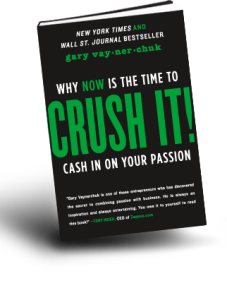This article originally ran at the RockStar Success Library a few years ago. Gary’s gone on to become a major personality in the social media world. I’m still ambivalent about whether that’s because of the validity of his ideas or the volume with which he shares them.
Big Thought
The ease of access to emerging social media platforms provides a vehicle that allows for individuals to create a personal brand that they can monetize.
Ideas, Implications, and Questions
- Gary skirts the line between being descriptive and prescriptive. As a descriptive book, it’s an interesting story of what allowed him to be successful. When it tries to be prescriptive, it falls apart because you can’t establish a cause and effect relationship.
- “If you’re not using Twitter because you’re in the camp that believes it’s stupid, you’re going to lose out. It doesn’t matter if you think it’s stupid, it’s free communication. That in and of itself has value, and you should take advantage of it.” (pg 71). That’s exactly what I told my intern when I started my Twitter account. I’m still not a huge fan of Twitter, but it’s a communication tool. That can go for a whole range of internet tools – you don’t have to like them, but don’t leave them on the table.
- Is passion enough? Gary feels that it is – if you build your brand in an area that you love, you’ll eventually be able to make money doing it. I agree with him that it’s worth putting in the effort to create a business doing what enjoy. It’s harder than he indicates, though, especially because:
- People have to see a need for what you are doing. If it’s in an area that people aren’t willing to spend money on/be an audience for, it’s going to be hard to monetize.
- You have to be good at what you do. Gary points out that you have to have talent and knowledge to build your personal brand.
- Anything that has low barriers and scalability also has a lot of competition. If it’s easy for you to start – it’s easy for others to start. This is already building up a huge amount of mediocre noise. Gary would say that the best rise to the top. Yes, but it’s not always easy to be heard in all of the noise.
- It’s ironic that the cover testimonial is from Timothy Ferriss, the author of the 4–Hour Work Week, because Gary is also a huge proponent of working hard, or what he calls, hustle. “No one makes a million dollars with minimal work unless they win the lottery.” (pg 89). This is where he skirts the prescriptive/descriptive line, though, because the next sentence is, “The cool thing about hustle, though, is that it’s one more thing that equalizes the playing field.” Maybe, maybe not. I know lots of hard working people who haven’t crushed it. The trick is to work hard on the right activities.
Should you read this book? Who should read this book?
Yes, it’s an interesting snapshot on what can be done with current social media platforms. And following his credo, Gary is really passionate about his topic. People who will get a lot out of this book:
- Service—oriented professionals who can profit from a personal brand
- Entrepreneurs who are building a business
- Small business owners who want to build a community
- Professionals who need to be able to sell social media:
- Web designers
- Marketing professionals
- Graphic Designers
- Copywriters

